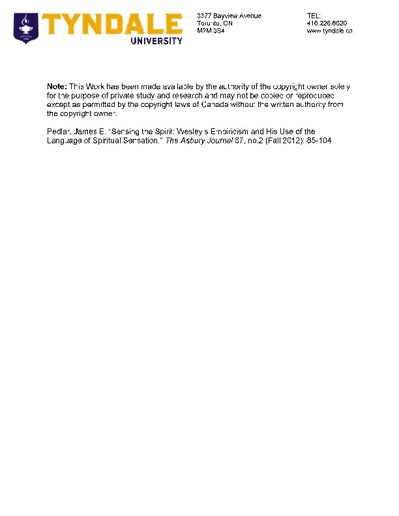| dc.rights.license | Attribution-NonCommercial-NoDerivatives 4.0 International License | en_US |
| dc.contributor.author | Pedlar, James E., 1979- | |
| dc.date.accessioned | 2021-02-06T15:53:18Z | |
| dc.date.available | 2021-02-06T15:53:18Z | |
| dc.date.copyright | 2012 | |
| dc.date.issued | 2012 | |
| dc.identifier.citation | Pedlar, James E. "Sensing the Spirit: Wesley's Empiricism and His Use of the Language of Spiritual Sensation." The Asbury Journal 67, no. 2 (Fall 2012): 85-104. DOI: 10.7252/Journal.01.2012F.05 | en_US |
| dc.identifier.issn | 2375-5814 | en_US |
| dc.identifier.uri | https://digitalcollections.tyndale.ca/handle/20.500.12730/375 | |
| dc.description.abstract | This paper examines the relationship between John Wesley’s empiricism and his use of the language of “spiritual sensation.” Through a close reading of Wesley’s own espousal of empiricism, as well as his use of the language of the spiritual senses, it will be argued that Wesley, while committed to empiricism as a natural epistemology, views the experience of the Spirit as something which is known intuitively. His references to the spiritual senses are therefore best understood as an analogy for this intuitively known experience of the Spirit. While Wesley’s discussions of spiritual sensation are not simply an extension of his empiricism, he does, at times, try to integrate his account of theological knowledge with his empiricism. The paper concludes by addressing challenges that Wesley’s use of the language of spiritual sensation poses for both the coherence and the adequacy of his theology. | en_US |
| dc.description.uri | https://place.asburyseminary.edu/asburyjournal/vol67/iss2/7/ | en_US |
| dc.format.mimetype | application/pdf/ua | en_US |
| dc.language.iso | en | en_US |
| dc.publisher | Asbury Theological Seminary | en_US |
| dc.rights | Copyright, Asbury Theological Seminary. All rights reserved. | en_US |
| dc.rights.uri | https://creativecommons.org/licenses/by-nc-nd/4.0/ | en_US |
| dc.subject.lcsh | Wesley, John, 1703-1791--Empiricism | en_US |
| dc.subject.lcsh | Holy Spirit | en_US |
| dc.subject.lcsh | Spirituality--18th century | en_US |
| dc.title | Sensing the Spirit: Wesley's Empiricism and His Use of the Language of Spiritual Sensation | en_US |
| dc.title.alternative | Wesley's Empiricism and His Use of the Language of Spiritual Sensation | en_US |
| dc.type | Article | en_US |
| dc.contributor.affiliation | Tyndale University | en_US |
| dc.contributor.department | Seminary | en_US |
| dc.contributor.repository | Tyndale University, J. William Horsey Library, 3377 Bayview Ave., Toronto, ON, M2M 3S4, Canada. Contact: repository@tyndale.ca | en_US |
| dc.date.digitized | 2021 | |
| dc.identifier.doi | 10.7252/Journal.01.2012F.05 | en_US |
| dc.identifier.issue | 2 | en_US |
| dc.identifier.journal | The Asbury Journal | en_US |
| dc.identifier.orcid | https://orcid.org/0000-0003-3471-8427 | en_US |
| dc.identifier.volume | 67 | en_US |
| dc.publisher.place | Wilmore, KY | en_US |
| dc.rights.holder | Asbury Theological Seminary, 204 N. Lexington Ave., Wilmore, KY 40390, U.S.A. | en_US |
| dc.subject.keyword | Wesley, John 1703-1791 | en_US |
| dc.subject.keyword | Empiricism | en_US |
| dc.subject.keyword | Epistemology | en_US |
| dc.subject.keyword | Holy Spirit | en_US |
| dc.subject.keyword | Senses and sensations | en_US |
| dc.subject.keyword | Spiritual senses | en_US |
| dc.subject.keyword | Knowledge of God | en_US |
| dc.description.chapterpage | 85-104 | en_US |
| dc.description.note | For AODA accommodation, including help with reading this content, please contact repository@tyndale.ca | en_US |


